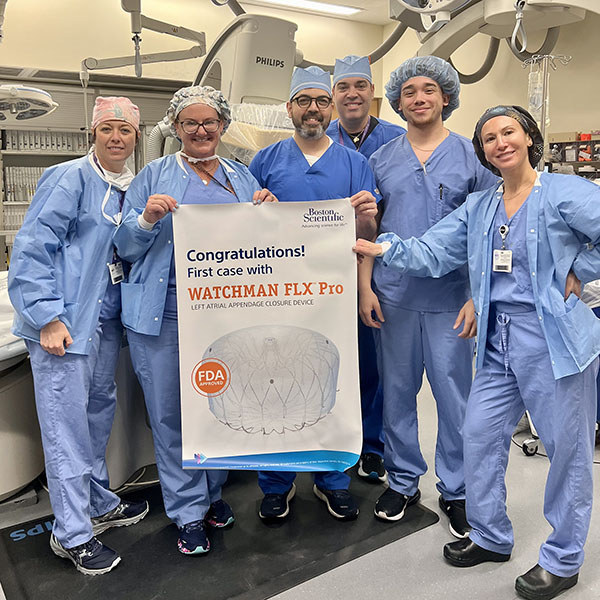St. Mary Medical Center first in Bucks County to implant Watchman FLX Pro device
June 17, 2024Tags: St. Mary Medical Center
Permanent heart implant featuring a coating is designed to reduce stroke risk in patients with non-valvular atrial fibrillation.
 Langhorne, Pa. – (June 18, 2024) – St. Mary Medical Center is pleased to announce that it is the first hospital in Bucks County to implant the new Watchman FLX™ Pro Left Atrial Appendage Closure (LAAC) Device. The device features the latest LAAC technology, designed to reduce stroke risk and serve as an alternative to the lifelong use of blood thinners for people with atrial fibrillation not caused by a heart valve problem (also known as non-valvular AF or NVAF).
Langhorne, Pa. – (June 18, 2024) – St. Mary Medical Center is pleased to announce that it is the first hospital in Bucks County to implant the new Watchman FLX™ Pro Left Atrial Appendage Closure (LAAC) Device. The device features the latest LAAC technology, designed to reduce stroke risk and serve as an alternative to the lifelong use of blood thinners for people with atrial fibrillation not caused by a heart valve problem (also known as non-valvular AF or NVAF).
The Watchman FLX Pro implantation procedure was performed on May 1, 2024, by Syed Hussain, MD, an interventional cardiologist at St. Mary. Since the initial procedure, an additional 17 Watchman FLX Pro implants have been performed on patients at St. Mary.
Built upon the proven safety and procedural performance of the Watchman FLX™ LAAC Device, the Watchman FLX Pro device features a permanent polymer coating that is designed to reduce the risk of device-related thrombus, visualization markers for enhanced placement and a broader size matrix to treat a wider range of patients.
An estimated seven million Americans are estimated to be affected by atrial fibrillation. People with AF have a greater risk of stroke than those with normal heart rhythms. The Watchman FLX Pro device closes off an area of the heart called the left atrial appendage (LAA) to keep harmful blood clots that can form in the LAA from entering the blood stream and potentially cause a stroke. By closing off the LAA, the risk of stroke may be reduced to less than one percent, similar to the reduction of strokes on anticogulation. The benefit is that after implantation patients can stop taking oral anticoagulants (blood thinners).
The Watchman technology has been implanted to treat more than 300,000 patients worldwide and is done in during a single procedure. This permanent device doesn’t have to be replaced and can’t be seen outside the body. The procedure is done under general anesthesia and takes about an hour. Some patients may need an overnight stay, but most can be discharged the same day.
Learn more about cardiovascular care available at St. Mary.
